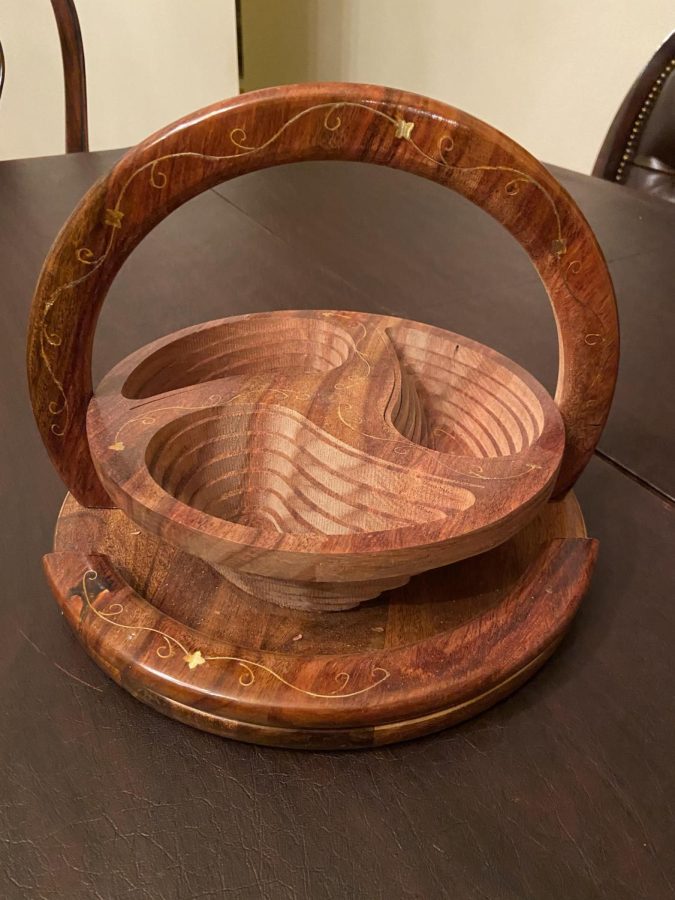Why I Love Wooden Bowls
I had woken up that hot morning sweating buckets. It was almost as if the summer in Pakistan that year was punishing me for all the time I complained about being too hot or too cold or being too tired or too bored. That day, we went to the bazaar (outdoor mall). No one comes to Pakistan without getting an unhealthy amount of clothes, decorations, stationery and jewelry. But for me, I loved going out to hear the motorcycle engines roar and to see the vendors set up small stands, selling fake luxury items while exclaiming their authenticity. But I mostly loved going out to wear salwar kameez (traditional pakistani clothing). Many people wear normal shirts and pants, but I loved the idea of wearing patterns and bright colors without subconsciously thinking I look too flashy or too extravagant. Because, in all honesty, on the Pakistani streets, no one pays attention to superfluous fashion trends. The only thing they care about is business.
My mom, grandfather and I had got out of our car into the bustling Pakistani streets where I saw the bazaar close by. A collection of different booths and shops crowded the area and you could hear distant conversations of people bargaining like their life depended on it. The air was dusty and thick but I appreciated it because to me, it symbolized the essence of labor. In America, I didn’t just breathe clean air. I breathed privilege. It was a privilege to have access to clean water as close to me as my fingertips. It was a privilege to not have to work several jobs to support my family. It was a privilege that I didn’t have to ride on a motorcycle with 5 other people because I couldn’t afford a car. It was a privilege to have so much accessible to me that I began to fathom the elegance of dirt and sweat produced by the hands of talented workers.
I came across a small shop with a middle aged man carving into a wooden bowl. The walls around him were half cream and half blue with small black marks along the skirting. The man was sitting with his legs crossed on 3 pillows, all of which had tassels protruding out from the corners. His head drooped down, carving knife in his right hand, as small scoring noises scratched the air as the blade came in contact with the wood. Right when I stopped at the shop, the man said (in Urdu), “Hello ma’am. I have many beautiful bowls and plates, please take a look.” I looked at the display of handsomely carved bowls and thought to myself, how did he make these designs by hand? I was truly impressed that someone had such a steady hand to create the most dainty designs that fit together so harmoniously.
As I ran my hand through the surface of a particular bowl, I looked around wondering where all his customers were. It was almost as if everyone was dispersed away from that man’s stall. I heard women nearby talking about how cotton was a better material to wear in the summer and men talking about how a certain imported cologne would make the ladies go wild. It baffled me that I was the only one enjoying the intricate patterns and arrangement of these designs that were carved with a single knife by hand. It bothered me that this man, with such raw talent, was sitting on the floor of his little shop with piles of bowls ready to be bought. It bothered me that this man had such little opportunity in a country he worked so hard in. And it bothered me knowing that his labor went unrecognized.
The man started bargaining with me and said, “I can give you two discounted. The bowls are very good quality and look at these designs.” I could tell by his voice change and the way his eyes lit up, he wanted me to see his skill and not just give him my money. “I’m sorry, I don’t have money with me right now. I will come back to your shop,” I replied, apologetically. Even though I’m not obligated to give that man my business, I felt like it was something I should have done. Not necessarily out of pity, but just to let him know that his natural endowment and continuous labor was something commendable to me.
I walked over to my mom in the next stall and told her about the small shop and the beautiful bowls. I saw her rummage through her wallet of a couple rupees, being careful not to drop any. She quickly paid for her things and we went to the bowl shop. The man saw us walk in and looked at us with a surprised yet delighted expression and he immediately started showing my mom the assortment of bowls he had hand crafted. They started bargaining, which I began to hate. In America, we would simply buy things and not question the price, so it made me upset that this man had to make his prices more reasonable just to sell his bowls that probably took hours to make. I whispered to my mom and told her to stop lowering the price because he’s a hard working man and she agreed. Bargaining with the shopkeepers in Pakistan was instinctive. Everyone thinks that they will get swindled in the street shops that they forget when some sellers are being reasonable. We paid, left, and went to other shops and booths in the bazaar where I saw more people creating and constructing goods by hand.
I cherish that wooden bowl everyday and think of the grateful man on that hot summer day.


